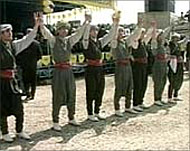Snags hit Turkey’s language reforms
With Ankara pushing hard towards future membership of the European Union, reforms in minority rights demanded by Brussels have recently hit a snag: the letters Q, W and X.

“It’s become a kind of comedy,” said film director Kazim Oz, one of Turkey’s 12 million ethnic Kurds. “They are committing acts of violence against letters.”
Yet, while the issue may have its absurd side, it is also being seen as a major test of just how far Turkey’s authorities are prepared to go in allowing Kurdish minority rights.
Names outlawed
The trouble started after the interior minister declared a number of changes in the country’s naming laws in September. These changes were designed to help the country meet EU criteria on the treatment of ethnic and religious minorities.
Previously, only Turkish, Muslim names had been permitted for any babies born in the secular republic – a source of discomfort for both the country’s small non-Muslim community and for its large non-ethnic Turkish one.
Principal among the latter group are the Kurds, who have long had both an official, Turkish first name and an unofficial, Kurdish one used by friends and relatives.
“My mother’s name is something other than what is on her identity card,” said Oz, who directed a groundbreaking film for Ankara by using Kurdish with Turkish subtitles last year. “In fact, many people are like that.”
Political implications
With guerrilla warfare raging between Kurdish fighters and the Turkish army during the 1980s and the 90s, Ankara’s courts often saw parents’ desire to give their children Kurdish names as support for the militants.
|
“They are committing acts of violence against letters” |
Jail sentences were common for calling your child Xebat, Axgin, Pervagin or Berwada.
However, under the new regulations, parents are now allowed to give any name they like to their children – provided it does not “go against general morals” or cause “a public insult”.
However, in writing the name, they must also use the existing Turkish alphabet.
Barriers
Here lies the difficulty. “The Kurdish and Turkish languages don’t have any connection,” said linguist Mulazim Ozcan. “And, as with all languages, both have developed their own grammar – and alphabet.”
In Kurdish, the letters Q, W and X are commonly used in names, yet do not exist in the Turkish alphabet. Using them therefore falls outside the law.
“We welcome the reform,’ said Ferhat Yegin, deputy head of the pro-Kurdish Free Society Party. “But the ban on some letters is not in conformity with the spirit of the amendment.”
Yegin was among about 50 Kurdish activists who filed applications with the courts to have their names changed to Kurdish spelling in late October. He wants his first name to be officially registered as “Qalferat”.
Yet, many object to such moves. “Of course, they can’t write a letter that doesn’t exist in the Turkish alphabet,” said Cavit Torun, a parliamentary deputy for the ruling Justice and Development Party (AKP), who comes from the largely Kurdish city of Diyar Bakir.
“They can just give the sound of the Kurdish name using Turkish letters.”
Background
 |
|
Kurds struggle to practice their |
The Turkish alphabet – which uses Latin letters with several additional characters – was created in the 1920s by the republic’s founder, Mustafa Kemal Ataturk.
As part of his efforts to turn the country towards the West, he discarded the previous, Arabic script that Turks had used for centuries.
“When they took on the Latin alphabet,” said Ozcan, “they had to add new letters to fit certain sounds in Turkish that aren’t common in Western countries.”
Now, he said, it is time to add some more. “Banning letters is illogical,” he said. “It’s a completely political decision.”
The letters Q, W and X are already in widespread usage in advertising and computers, where the ubiquitous www internet address prefix is constantly in use across Turkey.
“If you don’t accept the alphabet, then you don’t accept the language,” said Oz. “It makes the reform of the naming law nonsense.”
Litmus test
With the European Union looking to see how well Turkey implements a wide range of reforms now on the country’s statute books, the issue of the Kurdish language is already proving a significant test.
The government has also passed laws allowing the language to be studied and taught – albeit at private, fee-paying language schools, rather than in national, state schools.
“The government passed a series of laws to bring the country into line with EU legislation,” said Torun. “These included being able to open native language courses and teach those languages, as well as allowing them to be broadcast on radio and TV.”
Implementation
|
“But if there’s no change on the inside – in people’s attitudes – then the changes on the outside just don’t work” |
However, Kurdish activists say that no classes have actually started. Torun denies this, saying that “everything is ready to start – as far as I heard, one course has actually begun in the south-eastern city of Batman”.
He blames the fact that the courses are fee-paying for their failure to begin elsewhere – and points to potential further reform as the solution.
“Once these courses are brought within the national education system, then things will be different. At normal schools, learning Kurdish would be free.”
For Oz, that would be a major step forward, but he – like many other Kurds – is far from hopeful that major changes like this can take place.
“I want to believe it,” he said, “but I don’t think it’s so likely at the moment. The EU has had a positive influence and in general, yes, there have been positive changes. But if there’s no change on the inside – in people’s attitudes – then the changes on the outside just don’t work.”